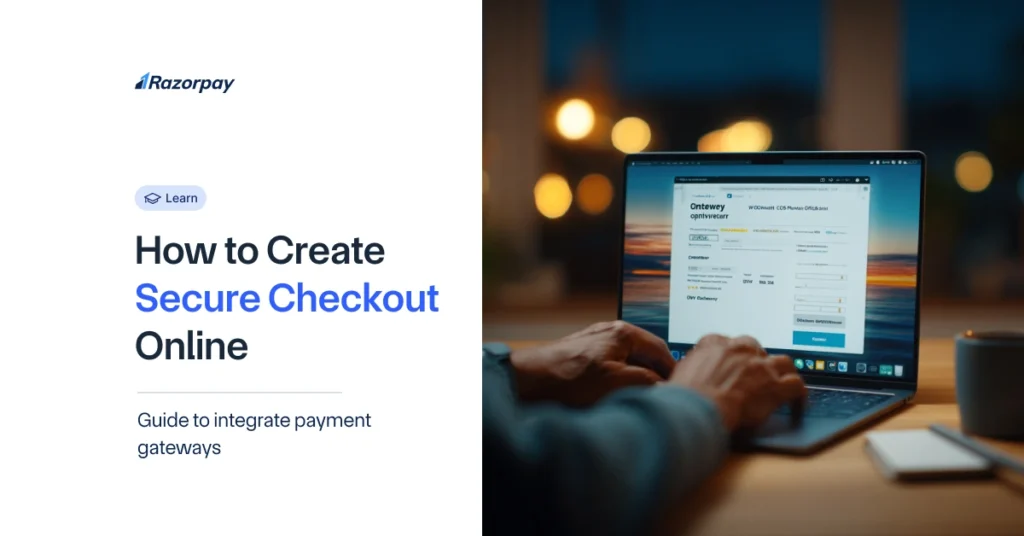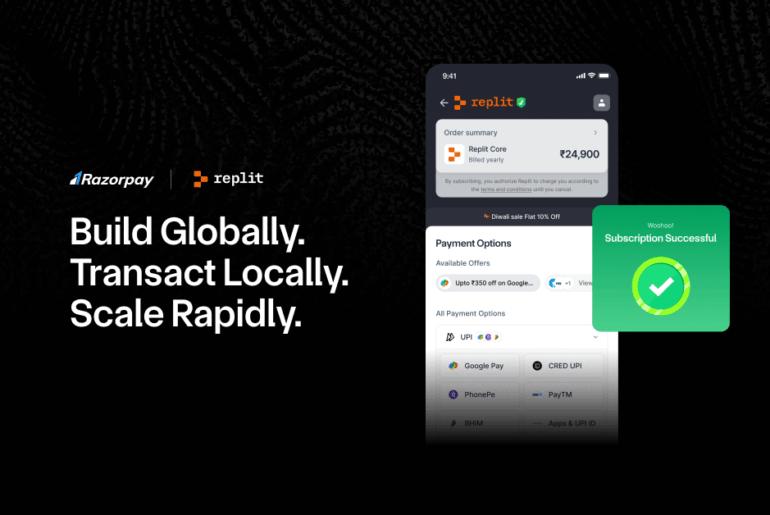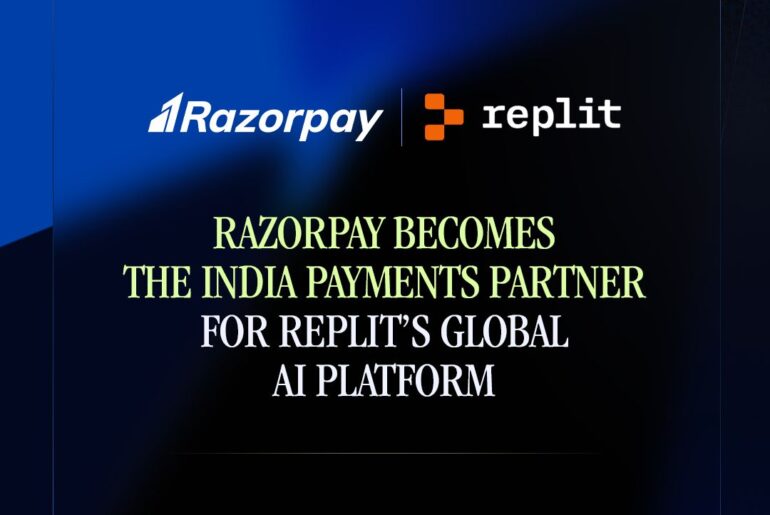Your website’s checkout page makes or breaks a potential conversion. If your checkout page contains an unsecured payment option or is slow-loading, it can lead to potential drop-offs. A study by the Baymard Institute suggests that close to 18% of users abandon carts due to a lack of confidence in the website’s credit card-based payment system. Establishing a secure checkout process encourages customers to continue with their purchases while providing them with an enriching shopping experience. Razorpay’s payment solutions are compliant with the necessary security requirements and support a wide range of payment methods.
Key Takeaways
Creating a secure checkout process has become the need of the hour, as more and more cases of digital payment fraud is reported, every passing day.
Having a secure checkout process as part of your business website’s checkout page can improve your brand’s trustworthiness, retain customers and prevent significant drop-offs from happening.
SSL, Tokenization, compliance with PCI-DSS, including secure payment gateways are some of the main elements of an effective secure checkout process.
Razorpay is compatible with most websites and possesses the necessary security features, making transactions simple, safe and secure.
What Is Secure Checkout?
A secure checkout refers to a set of protocols that are implemented on your business website’s checkout page, ensuring compliance with the latest security standards. Implementing a secure checkout is one of the ways to ensure successful conversions and retain valuable customers. For merchants who are Razorpay members, building a secure checkout process can give them an edge over their competitors.
Why Secure Checkout Matters
In an era where digital payments and contactless transactions have become the norm, storing sensitive financial data has become the need of the hour. With increasing cases of digital fraud and online pyramid schemes, including a secure checkout process is a foolproof way to ensure successful transactions. Doing so;
- Enhances a brand’s trustworthiness and credibility, reducing drop-offs.
- Ensures compliance with security standards like PCI-DSS.
- Shields businesses from costly fraud, chargebacks and data breaches.
Key Elements of a Secure Checkout Process
SSL Encryption (HTTPS): A Secure Socket Layer certificate with your website URL indicates that your site is safe to visit, reasserting customer’s trust in your brand and increasing the likelihood of them completing the transaction successfully.
Razorpay mandates using HTTPS to encrypt all customer data during the checkout process, preventing unauthorized interception.
PCI-DSS Compliance: The Payment Card Industry Data Security Standard, more commonly known as PCI-DSS, is a regulatory requirement that requires all online businesses to enact certain policies and protocols to protect credit card payment transactions.
Secure Payment Gateways: Another crucial factor in a successful secure checkout process is to deploy PCI-DSS compliant payment gateways. Gateways like Razorpay are programmed to always protect data through tokenisation, real-time fraud detection and advanced encryption.
Tokenization: With tokenisation, sensitive data in a card is replaced by random characters, thus preventing unnecessary data breaches. It is an excellent security measure to prevent scammers from doing any significant damage to your finances through stolen data.
Two-Factor Authentication (2FA): A two-factor authentication is a foolproof method to ensure genuine transactions between customers and merchants. It is another foolproof method to ensure authentic transactions. In two-factor authentication, users are asked to enter an OTP which is exclusively sent to their registered phone number and their PIN.
Webhooks for Real-Time Payment Updates: Automated payment status updates ensure transparency and accurate order processing, reducing manual intervention and risk of human error.
API Key Security: Your payment gateway’s API keys must never be exposed as public code. Always store credentials securely on the server side, and restrict access as much as possible.
User Input Validation: Thorough server-side input validation identifies and rejects fraudulent or suspicious activity during the checkout flow.
Mobile Optimization: A responsive, secure mobile checkout improves both user experience and conversion rates, especially important as mobile commerce grows.
Razorpay’s Best Practices for Creating a Secure Checkout
1. Start with a Secure Foundation
- Host your website or app using secure HTTPS with an active SSL certificate. Ensure that the hosting service provides HTTPS-enabled
- Renew your SSL certificates every year, and check for vulnerabilities through penetration testing and other ethical hacking techniques.
2. Integrate Payment Gateway’s Secure Checkout Module
- Use your payment gateway’s secure checkout module to activate the process.
- Always use server-side APIs for critical operations and never expose secret keys in client code.
3. Enable Authentication and Payment Verification
- Implement one-time password (OTP) authentication or biometric verification for sensitive transactions.
- Set up additional merchant-level 2FA for dashboard access and payments.
4. Use Tokenization for Payment Data
Tokenization replaces sensitive information relevant to the transaction with tokens which are not related to the transaction. This mitigates the possibility of cyber attackers intercepting payment information for any misuse.
5. Leverage Real-Time Webhooks
Configure webhooks to receive payment success/failure events directly from your payment gateway, enabling real-time order updates and reducing errors.
6. Follow API Key Management Guidelines
- Store API keys in secure, encrypted server environments.
- Rotate keys regularly and restrict access to only trusted systems.
7. Optimize for User Experience and Security
- Keep your checkout page simple—request only essential information.
- Use Razorpay’s trust badges, compliance signals, and recognizable icons to reassure buyers.
- Provide immediate, clear error messages and retry options on failed payments.
8. Monitor, Audit, and Update
- Conduct frequent security reviews and penetration testing.
- Stay informed on updates to Razorpay’s API and adopt security enhancements promptly.
- Use feedback from analytics and customer support to refine your checkout flow.
Razorpay Features That Strengthen Secure Checkout
PCI DSS Level 1 Certified: Razorpay’s payment platform is fully PCI DSS Level 1 certified for the highest level of card data safety.
Advanced Fraud Detection: Machine learning-driven fraud prevention to monitor patterns and flag suspicious behavior instantly.
24/7 Monitoring & Dispute Resolution: Robust monitoring and rapid dispute management tools to protect merchants and customers alike.
Ready to streamline your payments?
Conclusion
If you want your business to be taken seriously, understanding and implementing a secure checkout process is of the utmost importance. It ensures that you transact safely while ensuring compliance with regulatory requirements. A secure checkout can help mitigate the issue of drop offs significantly, increasing your conversions.
FAQs
What makes a checkout process truly “secure”?
If a merchant’s website implements technologies that comply with the existing security requirements, a checkout process will be secure, as there is very little scope for the same due to the robust checkout process.
How does tokenization protect customer data?
In Tokenization, important, secure information in a transaction is replaced by tokens which are irrelevant to the transaction, making it difficult for hackers to tap in and obtain information.
Does adding more security elements risk losing conversions?
Unless the security measures do not hamper a customer’s shopping experience by asking for too much information, conversions may not be affected. For example, when it comes to two-factor authentication, if a customer is required to enter OTP as well as validate the transaction with a PIN, it can lead to drop offs. On the other hand, if only an OTP were to be used to validate the transaction, it is highly unlikely that drop-offs may occur.
How often should I test my checkout for vulnerabilities?
As often as possible. It depends on the number of transactions your website handles on a day-to-day basis. However, employing payment gateways like Razorpay that employ technologies to monitor transactions in real time can be time-efficient for business owners, allowing them to focus on other key areas.


